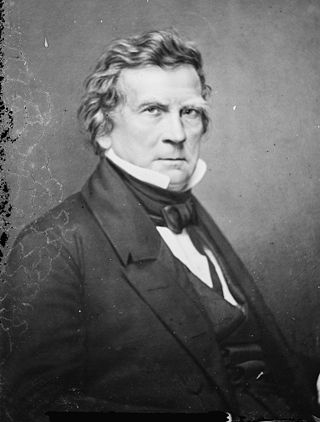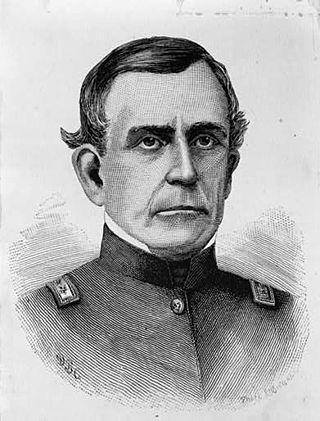
William Learned Marcy was an American lawyer, politician, and judge who served as U.S. Senator, Governor of New York, U.S. Secretary of War and U.S. Secretary of State. In the latter office, he negotiated the Gadsden Purchase, the last major acquisition of land in the contiguous United States.
The Damascus Affair of 1840 marks the real beginning of the diplomatic or international phase in the history of American Jews. The persecutions and tortures to which some of the most prominent Jews of Damascus had been subjected were reported to the Department of State at Washington, D.C. by the United States consul at Damascus. Immediate instructions, under date of 14 August 1840, were thereupon issued to John Gliddon, the United States consul at Alexandria, Egypt, by Secretary of State John Forsyth, in which he directed that all good offices and efforts be employed to display the active sympathy of the United States in the attempts that the governments of Europe were making to mitigate the horrors of these persecutions. Three days later David Porter, the United States minister to the Ottoman Empire, was instructed by Forsyth to do everything in his power at the Porte to alleviate the condition of the unfortunates. In both these communications the reasons for the intervention of the United States are based upon sentiments of justice and humanity, no American citizens being involved; in the communication to Minister Porter stress was laid upon the peculiar propriety and right of the intervention of the United States, because its political and civil institutions make no distinction in favor of individuals by reason of race or creed, but treat all with absolute equality.

Duncan Nathaniel Ingraham was an officer in the United States Navy who later served in the Confederate States Navy.

The Levant Company was an English chartered company formed in 1592. Elizabeth I of England approved its initial charter on 11 September 1592 when the Venice Company (1583) and the Turkey Company (1581) merged, because their charters had expired, as she was eager to maintain trade and political alliances with the Ottoman Empire. Its initial charter was good for seven years and was granted to Edward Osborne, Richard Staper, Thomas Smith and William Garrard with the purpose of regulating English trade with the Ottoman Empire and the Levant. The company remained in continuous existence until being superseded in 1825. A member of the company was known as a Turkey Merchant.

USS Ingraham (DD-444), a Gleaves-class destroyer, was the second ship of the United States Navy to be named for Captain Duncan Ingraham (1802–1891), who was awarded a Congressional Gold Medal following his actions regarding Martin Koszta, a Hungarian who had declared in New York his intention of becoming an American citizen, and who had been seized and confined in the Austrian ship Hussar.

USS St. Louis was a sloop-of-war in the United States Navy through most of the 19th century.
Julius Hermann Kroehl was a German American inventor and engineer. He invented and built the first submarine able to dive and resurface on its own, the Sub Marine Explorer, technically advanced for its era. His achievements in architecture, civil and mechanical engineering were also significant.

Sir Frederick William Adolphus Wright-Bruce, GCB was a British diplomat.

Grenada – United States relations are bilateral relations between Grenada and the United States. The United States recognized Grenada on the 7 February 1974, as the same day as Grenada got independence from the United Kingdom of Great Britain and Northern Ireland. These nations formally established diplomatic relations on 29 November 1974.

Diplomatic relations between Switzerland and the United States were established in 1853 by the U.S. and in 1868 by Switzerland. The first diplomatic representation of the U.S. was established in Basel in 1853.

John Randolph Clay was an American diplomat.
Events from the year 1853 in the United States.

The 1876–77 Constantinople Conference of the Great Powers was held in Constantinople from 23 December 1876 until 20 January 1877. Following the beginning of the Herzegovinian Uprising in 1875 and the April Uprising in April 1876, the Great Powers agreed on a project for political reforms in Bosnia and in the Ottoman territories with a majority-Bulgarian population. The Ottoman Empire refused the proposed reforms, leading to the Russo-Turkish War a few months later.

Christopher Hughes was an American attorney and diplomat who served as Chargé d'affaires in Sweden and The Netherlands in the 1820s and 1830s. He was the son in law of United States Senator Samuel Smith.
Honey Creek Township is a township in Iowa County, Iowa, USA. It is named after the Honey Creek, a tributary of the Iowa River, which flows through it in a northwesterly direction.

Ahmet Rüstem Bey (1862–1934), born Alfred Bilinski, was an Ottoman diplomat who served as last Ottoman ambassador to the United States in 1914. Despite neither of his parents being ethnically Turkish, he himself was an ardent Turkish nationalist. He was "exceptionally high-strung and outspoken" and had a "propensity to challenge people to duels". Prior to his appointment as ambassador, he had already served twice in the United States capital, both times leaving in a hurry.
The United States established relations with North African countries and with the Ottoman Empire after 1780.
Cornelius Van Hemert Engert was an American diplomat who served in Ethiopia, Iran, and Afghanistan.

Marcello Cerruti was an Italian diplomat and politician. He was appointed senator of the Kingdom of Italy in 1870.













